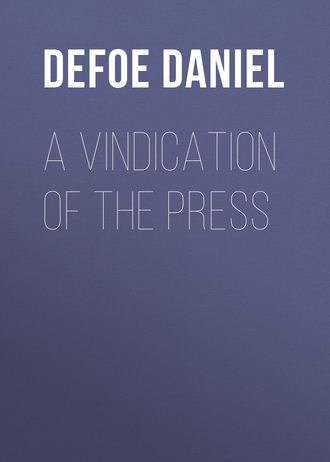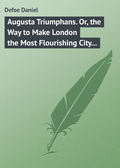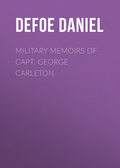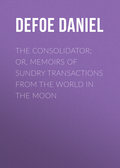
Даниэль Дефо
A Vindication of the Press
I should like to thank Dr. Henry C. Hutchins for his generosity in making available to me Professor Trent's ms. notes on A Vindication and Dr. John Robert Moore for his kindness, criticisms, and suggestions.
Otho Clinton Williams
San Jose State College
Vindication of the Press:
OR, AN ESSAY ON THE Usefulness of Writing, ON CRITICISM, AND THE
Qualification of AUTHORS.
Wherein is shewn,
That 'tis for the Advantage of all Governments to encourage Writing; otherwise a Nation would never be secure from the Attempts of its most secret Enemies; Barbarous and prejudic'd Criticisms on Writings are detected, and Criticism is justly stated. With an Examination into what Genius's and Learning are necessary for an AUTHOR in all manner of Performances.
LONDON:
Printed for T. Warner, at the Black-Boy in Pater-Noster-Row.
MDCCXVIII.
[Price Sixpence.]
[ILLUSTRATION]
A Vindication of the PRESS:
OR, AN ESSAY ON THE Usefulness of Writing, &c.
The very great Clamour against some late Performances or Authorship, and the unpresidented Criticisms introduc'd, render a Treatise on the Usefulness of Writing in general so absolutely necessary, that the Author of this Essay has not the least Apprehensions of Displeasure from the most inveterate, but on the contrary, doubts not an Approbation, even of the Great Mr. Dennis.
For the Usefulness of Writing in the Church, I shall trace back to the Annals of our Saviour and his Apostles. Had not Writing been at that Time in use, what Obscurity might we reasonably have expected the whole World would have labour'd under at this Day? when, notwithstanding the Infidels possess such vast Regions, and Religion in its Purity shines but in a small Quarter of the Globe. 'Tis easy-to imagine, that without the New-Testament every Person of excellency in Literature, and compleat in Hypocrisy, either out of Interest, or other worldly Views, would have taken the Liberty to deny the most Sacred Traditions, and to have impos'd upon the Populace as many Religions as they pleas'd, and that the ignorant Multitude would easily acquiesce, as they do in Turkey, and other distant Parts of the World, which deny the Divinity of our Saviour.
What fatal Errors, Schisms, and concomitant Evils would have been introduc'd, must be apparent to all Persons of the least Penetration. The Quakers might at this Time possibly have been our National Church, and our present Happiness, with regard to those Considerations, can no way be more lively and amply demonstrated than in taking a step at once from Mr. Penn's Conventicle to the Cathedral Church of St. Pauls.
The Regularity and heavenly Decorum of the latter, give an Awe and Transport to the Audience at the same time they ornament Religion; and the Confusion of the former fully shews, that as it only serves to amuse a Crowd of ignorant Wretches, unless meerly with temporal Views (Sectarists generally calculating Religion for their Interests) so it gives a License to all manner of Indecencies, and the Congregations usually resort thither with the same Regard as a Rake of the Town would do to Mother Wybourn's, or any publick Place of Diversion.
Whether it be not natural to have expected a Confusion in the Church, equal to that of the worst Sectaries in the World, had not the Use of Waiting been early attain'd and practis'd, I appeal to the Breast of every unprejudic'd Reader; and if so, how infinitely happy are we by the Use of our Sacred Writings, which clear up the Cloud of Ignorance and Error, and give a Sanction to our Religion, besides the Satisfaction we of the Church of England have in this felicitous Contemplation, that our Religion, since the Reformation, strictly observ'd, is the nearest that of our Saviour and his Apostles of any Profession of Faith upon Earth.
'Tis owing to Writing, that we enjoy the purest Religion in the World, and exclusive of it, there would have been no possibility of transmitting down entirely those valuable Maxims of Solomon, and the Sufferings of the Righteous Job, in the old Testament; which are so extensive to all Parts and Stations of Life, that as they are infinitely preferable to all other Writings of the Kind, so they afford the greatest Comfort and Repose in the Vicisitudes incident to Humane Nature.
How far Theology is improv'd from those inestimable Writings, I need not to enlarge, since it is highly conspicuous that they are the Foundation of all Divine Literature; and how ignorant and imperfect we should have been without them, is no great difficulty to explain; and who can sufficiently admire the Psalter of David, which fills the Soul with Rapture, and gives an Anticipation of sublimest Joys.
Besides the Advantages of Sacred Writings in the Cause of Religion; 'tis chiefly owing to Writing, that we have our most valuable Liberties preserv'd; and 'tis observable, that the Liberty of the Press is no where restrain'd but in Roman Catholick Countries, or Kingdoms, or States Exercising an Absolute Power.
In the Kingdom of France Writings relating to the Church and State are prohibited upon the severest Penalties, and the Consequences of those Laws are very Obvious to all Persons of Discernment here; they serve to secure the Subject in the utmost Obscurity, and as it were Effect an entire Ignorance, whereby an exorbitant Power is chearfully submitted to, and a perfect Obedience paid to Tyranny; and the Ignorance and Superstition of these People so powerfully prevail, that the greatest Oppressor is commonly the most entirely Belov'd, which I take to be sufficiently ently Illustrated in the late Lewis the Fourteenth, whose Arbitrary Government was so far from Diminishing the Affections of his Subjects, that it highten'd their Esteem for their Grand Monarch.
But of late the populace of France are not so perfectly enclouded with Superstition, and if a young Author can pretend to Divine, I think it is easy to foresee that the papal Power will in a very short space be considerably lessen'd if not in a great measure disregarded in that Kingdom, by the intestine Jarrs and Discords of their Parties for Religion, and the Desultory Judgments of the most considerable Prelates.
The best Support of an Arbitrary Power is undoubtedly Ignorance, and this cannot be better cultivated than by an Absolute Denial of Printing; the Oppressions of the Popularity cannot be thoroughly Stated, or Liberty in general Propagated without the use of the Press in some measure, and therefore the Subjects must inevitably submit to such Ordinances as an Ambitious or Ignorant Monarch and his Tyrannical Council shall think fit to impose upon them, how Arbitrary soever: And the Hands of the Patriots and Men of Eminence who should Illuminate the Age, and open the Eyes of the deluded People are thereby tied up, and the Infelicity of the Populace so compleat that they are incapable of either seeing their approaching Misery, or having a redress of present Grievances.
In Constantinople I think they have no such thing as Printing allow'd on any Account whatsoever; all their Publick Acts relating to the Church and State are recorded in Writing by expert Amanuensis's, so very strict are the Divan and great Council of the Sultan in prohibiting the Publication of all manner of Writings: They are very sensible had Persons a common Liberty of stating their own Cases, they might Influence the Publick so far, that the Yoke of Tyranny must sink if not be rendred insupportable; and this is regarded in all Kingdoms and Countries upon Earth Govern'd by a Despotick Power.
To what I have already offer'd in favour of the Press, there may be Exceptions taken by some Persons in the World; and as it is my Intentions to solve all Objections that may be rais'd to what I advance, as I proceed, I think I cannot too early make known, that I am apprehensive the following Observations may be made; viz. that a general License of the Press is of such a fatal Tendency, that it causes Uneasinesses in the State, Confusions in the Church, and is destructive sometimes even to Liberty, by putting the ruling Powers upon making Laws of Severity, on a Detection of ill Designs against the State, otherwise never intended.
In answer to which, I shall give the following Particulars: In respect to Uneasinesses in the State, it may not be amiss to premise, that it is esteem'd by Men of Penetration, no small Wisdom in the present Administration, to bestow Preferments on the brightest and most enterprising Authors of the Age; but whether it be so much out of a Regard to the Service they are capable of to the State in their Employs, as to their Writing for the Government, and to answer treasonable Pamphlets, poison'd Pens, &c. I do not take upon me to determine. I must confess, where a Faction prevails, it gives a sensible Monarch some Pain to see Disafection propagated by the Press, without any manner of Restraint; but then, on the other Hand, such a Ruler is thereby let into the Secrets of the Faction, he may with facility penetrate into their deepest Intrigues, and be enabled to avert an impending Storm. Upon approach of a Rebellion, he will be thoroughly sensible from what Quarter his greatest Danger is to be expected, whereby it will be entirely his own Fault, if he be without a sufficient Guard against it, which he could not be appriz'd of (with any certainty) without a general Liberty of Writing: And tho' Slander must occasion a great deal of Uneasiness to a crown'd Head, the Power of bestowing Favours on Friends only is no small Satisfaction to the Prince, and a sufficient Punishment to his Enemies. And it is my Opinion, that the Grand Sultan, and other Eastern Potentates, would be in a great deal less danger of Deposing, (a Practice very frequent of late) if in some measure a Liberty of Writing was allow'd; for the Eyes of the People would be open, as well for as against their Prince, and their fearing a worse Evil should succeed, might make them easy under a present Oppression.
As for Confusion in the Church, I look upon this to be the greatest Objection that can be raised; but then it must be allow'd, that without Writing the Reformation (the Glory of our Religion) could never have been effected; and in respect to religious Controversies, tho' I own they are seldom attended with good Consequences, yet I must beg leave to observe, that as the Age we now live in, is more bright and shining in substantial Literature than any preceding Century, so the generality of Mankind are capable of judging with such an Exactness as to avoid a Bad; not but, I confess, I think many of the Persons concern'd in the Controversy lately on foot, with relation to the Bishop of Bangor's Sermon, preach'd before His Majesty, deserve to be stigmatiz'd, as well for their indecent Heat, as for the Latitude taken with regard to the Holy Scriptures. And for the last Objection, I never knew that Writing was any ways destructive to Liberty, unless it was in a Pamphlet, [entitled King-Killing no Murder] which 'tis said occasion'd the Death of Oliver Cromwel.







